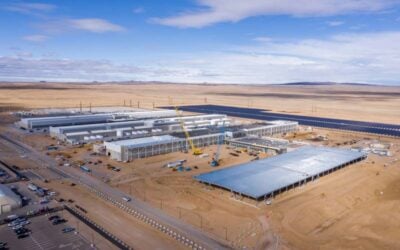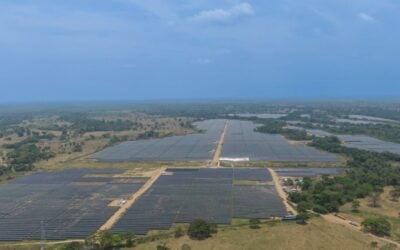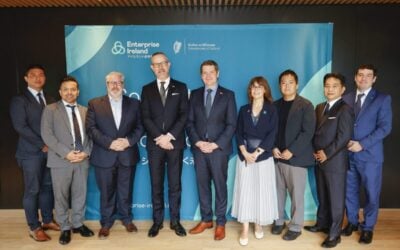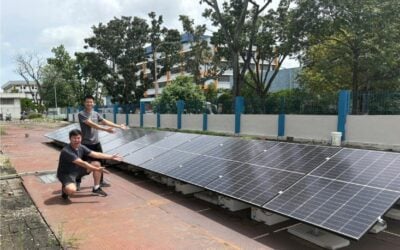
Eneos Renewable Energy will add energy storage to an existing solar PV power plant in southern Japan, after successfully applying for subsidies to support the project’s cost.
The renewable energy arm of Japanese petroleum company Eneos said this morning (8 July) that it was selected through a scheme to promote the addition of energy storage technology at solar PV facilities, hosted by the Japanese Ministry of Economy, Trade and Industry (METI) Agency for Natural Resources and Energy.
Enjoy 12 months of exclusive analysis
- Regular insight and analysis of the industry’s biggest developments
- In-depth interviews with the industry’s leading figures
- Annual digital subscription to the PV Tech Power journal
- Discounts on Solar Media’s portfolio of events, in-person and virtual
Under the scheme, subsidies can be applied for by operators and owners of solar power plants that receive the feed-in premium (FiP). The FiP is the state’s market-based financial compensation mechanism for large-scale PV and the successor to the feed-in tariff (FiT).
Eneos Renewable Energy appears to be the first to publicly announce its success in the scheme, called “Support Project for the Introduction of Storage Batteries Combined with Renewable Energy Sources,” for the FY2023 budget period.
Its battery energy storage system (BESS) asset at the JRE Fukuchi 3 Solar Power Plant must be in operation by a date in February 2025 and delivered at a cost of less than JPY120,000/kWh (US$746.34/kWh).
The company did not reveal the expected output or storage capacity of the BESS to be retrofitted at the 2.3MW PV plant in Fukuoka Prefecture, on the southern Japanese island of Kyushu.
It did note however that the subsidies would cover part of the investment cost, and that the BESS asset will be operated in line with a plan jointly developed between Eneos Renewable Energy (ERE) and Mitsubishi Research Institute (MRI).
The pair’s planning system will utilise MRI’s distributed energy resource (DER) control platform, MERSOL.
The system was developed in recognition that planning optimal market transactions, or optimisation, of BESS assets has been challenging in Japan as the platforms for forecasting renewable energy production and electricity demand have not been effectively linked with bidding and transaction platforms.
ERE said in June that it intends to utilise the planning system for its own energy storage projects, as well as offer it to third parties for whom it will operate assets. Such a system can help provide stable supply of variable renewable energy (VRE), and minimise imbalances between supply and demand.
Battery storage to help enable FiP solar projects to maximise profits
The government scheme was also held for FY2022. Chinese tech company Huawei, which was part of a special purpose vehicle (SPV) company selected in that previous round, noted that the feed-in premium requires solar PV plants to sell electricity to the grid when prices are high, and that batteries can better enable them to do this.
Huawei also said that while projects that previously received the FiT can be converted to FiP remuneration schemes, the business case without battery storage could be challenging. Satsuma Green Power 2 solar PV plant was one of the first such plants in Japan to make this conversion.
Satsuma Green Power 2 solar PV plant, also in Kyushu, was developed in the SPV with Japanese company Daiwa Energy Infrastructure’s subsidiary CO2OS, using Huawei’s LUNA 2000 BESS equipment. The market aggregator is Toshiba energy Systems and Solutions.
A Huawei representative told Japanese technology news outlet IT Media in May that the batteries enabled better “output controls” of the power plant, which went online in 2022, particularly as daytime solar generation in Kyushu often exceeds demand.
The support scheme is one of a number of programmes the Japanese government has introduced to promote the use of energy storage. Those taking part in the FiP-energy storage scheme cannot combine it with support from other subsidies, but they are allowed to add further generation or storage capacity to the project once fully operational.
Although market-based revenues can be earned in the country’s recently liberalised electricity sector, these are often uncertain and potentially insufficient to provide a solid base for investment of the kind seen in more mature energy storage markets including the US and the UK.
Read more ESN coverage about and related to Japan.
Energy-Storage.news’ publisher Solar Media will host the 2nd Energy Storage Summit Asia, 9-10 July 2024 in Singapore. The event will help give clarity on this nascent, yet quickly growing market, bringing together a community of credible independent generators, policymakers, banks, funds, off-takers and technology providers. For more information, go to the website.






